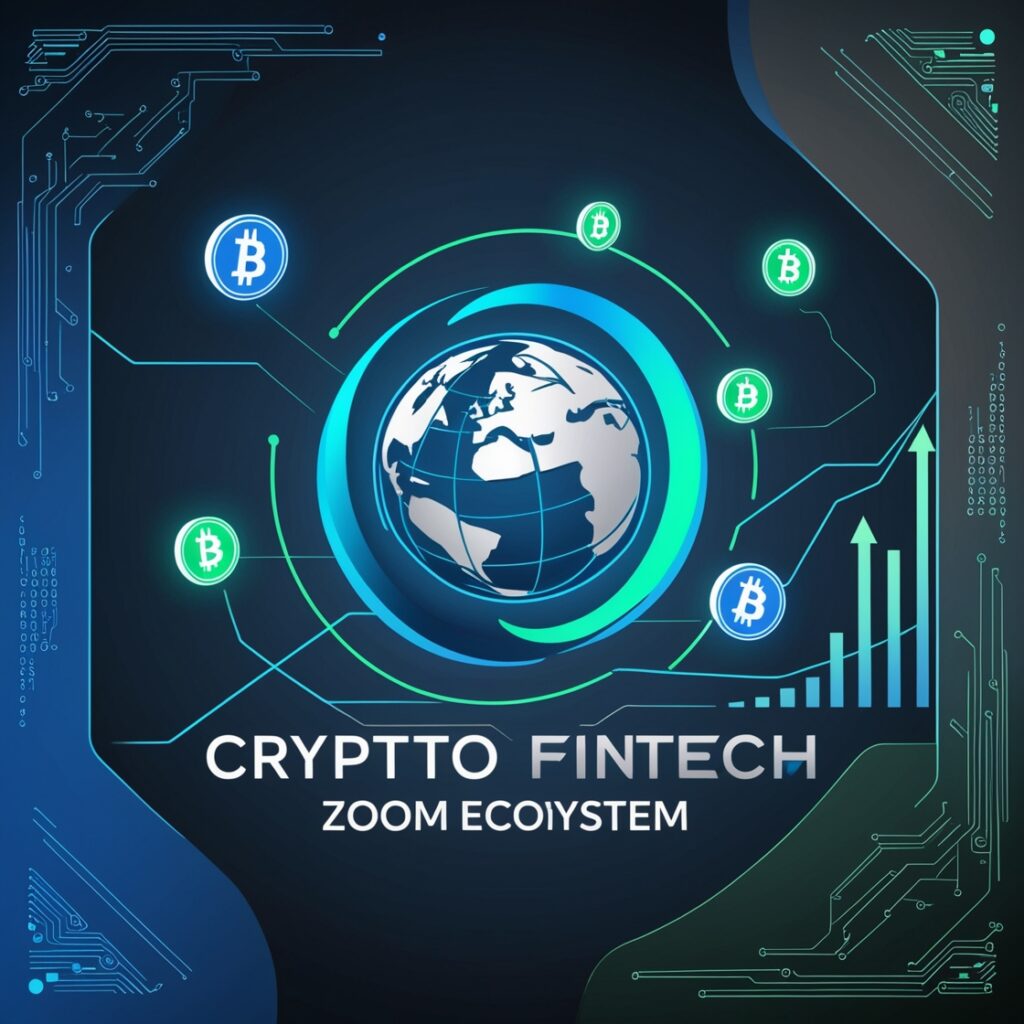
Table of Contents
Introduction to Crypto Fintech
Moving forward in the world of finance technology, the emphasis on the substitution of services offered by banks through cryptocurrencies has increased. Referring to this mixture of crypto and fintech, is my focus for this paper. Explaining how looking through crypto’s and its subcomponents lenses at currency, provides a good view on the future of the economy, seeing the possibilities and potentials.
Fintech crypto is the application of cryptocurrency and other digital property, such as a blockchain unit, into standard finance and its services. It includes the likes of a digital wallet, payment system, lending, and even an investing platform. Because fintech crypto utilizes Blockchain’s secure, transparent, and decentralized characteristics, it is able to make more efficient, universal and inclusive economic services for individuals and businesses.
In this article, we will attempt to cover the important aspects of crypto as a fintech and focus on areas in which it fits within the bigger picture of digital finance, what advantages it brings in, what is new in the field and areas that still need improvement. Additionally, we will also look at one of the foremost crypto fintech advancements, Crypto Fintech Zoom as well as the data presented at the ACAMS Fintech & Crypto Summit. Last, we will also provide more value to those who are considering participating in crypto fintech by giving some recommendations and explaining the legal aspects concerning the economic viability of this genre in detail.

Understanding the Role of Crypto Fintech in Digital Finance
Let’s begin with definitions. According to recent research, the crypto-fintech industry has developed due to the integration of cryptocurrency and Blockchain into financial services (Forleo, 2020). On the whole, the integration of cryptocurrencies and blockchain technology in finance can solve several issues in the field, including cross-border payments, asset management, and even the broader issue of financial development and access.
Cross-border transactions are a significant barrier as crypto-fintech claims to make the market inclusive, with inclusive detailing the easiest access or having the lowest barrier of entry. People have great concerns regarding transaction costs, the time taken to complete transactions and the safety of the transaction, with a great number of people losing money due to transaction costs. With cross-border transactions remaining a significant barrier, cryptocurrency provides decentralization, which is global; all these features provide security to crypto holders that crosses the barriers of significant costs. This has an impact on businesses and individuals who work on a global scale, as they can make international transactions effortlessly while having easier access to finance through underserved communities.
Furthermore, it is essential to mention that these crypto-fintech solutions are aimed at expanding access to financial services for the unbanked and underbanked populations. Crypto fintech is creating opportunities for people to engage in economic activity through access to digital wallets, mobile banking apps, and peer-to-peer loans without regard to their location across the globe.
Another significant contribution of crypto fintech can be seen in the areas of asset management and even investment. Investment into a plethora of different things, such as digital assets and tokenized securities, even decentralized finance protocols, has its place in crypto fintech platforms. These solutions allow investors to expand their investment options and move into new asset classes or to earn more, all this without exposing themselves to risk because of the great transparency provided by the Blockchain.

The Benefits of Crypto Fintech
As we dive deeper into the realm of crypto fintech different aspects need to be considered which benefit the individual and businesses greatly. Here are a few of the essential benefits of this particular field:
Enhanced Financial Inclusion: crypto fintech solutions such as digital wallets and mobile banking apps are aimed at the unbanked and underbanked populations, creating avenues for these individuals to engage in global financial systems.
Increased Transparency and Safety: First of all, a wide range of crypto fintech solutions rely on Blockchain technology which is the most transformable technology in recent years. Blockchain technology encourages the capture of trust by lowering the chances of fraud. It guarantees the occurrence of transactions with an unprecedented degree of safety and trust that has been revolutionary for world economics and finance.
Decreased Cost and Time of Transactions: The crypto fintech world is also hypothesized to make transactions less costly and time intensive, especially in regards to the international transfer of payments, since there will be greater reliance on alternative monetary exchange markets by eliminating intermediaries.
Greater Range of Investment: Investment in crypto fintech platforms gives access to an array of digital assets and investment products that would enable an investor to have a more diversified portfolio in order to make more money.
Increased Effectiveness and Decreased Manual Intervention: Most crypto financial technologies are likely to make use of smart contracts and other automated processes that modify business activities in the financial sector and take out human intervention in order to make privacy purchases, which increases operational efficiency.
Wider Reach: In addition, crypto fintech expects to increase financial inclusion by reaching uninsured populations and tapping into new markets by providing access through technology.
All of these factors concern the potential reasons why the world of finance is going to be altered significantly by the evolution of crypto fiat technologies. They all make the world of finance open, effective, and safe for everyone.

Key Trends and Developments in Crypto Fintech
As cryptographic and financial technologies develop, some major trends and advancements have come to the fore, which will affect the future of finance in digital form. Let’s look at some of the most important ones:
DeFi: One of the dominant trends within Crypto Fintech has been the rise of decentralized finance, which is characterized by the emergence of protocols and platforms that allow for the lending, borrowing, and trading of digital assets without any central financial institution.
Another trend that is gaining traction in the crypto fintech space is the tokenization of traditional assets such as real estate art and securities. In simple terms, this involves the issuance of tradeable assets on the Blockchain as digital tokens that increase liquidity, transparency and accessibility of the said assets.
There is a revolution in monetary transactions that has come with the inclusion of stablecoins and central bank digital currencies CBDCs. Stablecoins are types of cryptocurrency with ties to the US dollar, and CBDCs are developed by central banks. Thanks to these currencies, the perception of money changes fundamentally.
Crypto fintech facilitates the development of new types of lending and borrowing, whereby users can use their digital assets as collateral for loans or earn interest on the cryptocurrency assets they hold in their accounts.
P2P Payments, Remittances and Cryptocurrencies: Cryptocurrencies have revolutionized how international payments are made by enabling users to send and receive money instantaneously and affordably. This is one of the most notable developments in the crypto-fintech region, especially for those who are engaged in international trade.
Institutions in the Financial Sector: As time passes and the crypto-fintech sector grows, integration and adoption of these systems by traditional financial entities like banks, investment companies, and other payment providers are on the rise, which in return boosts the use of digital assets and blockchain technology.

Exploring Different Types of Crypto Fintech Solutions
The crypto fintech industry offers an array of solutions that are geared towards addressing various goals and fulfillments. Some of the types of crypto fintech solutions:
Online Wallets: These include convenient digital wallets on crypto fintech platforms that enable clients to store, manage and send cryptocurrency as well as other digital assets.
Exchanges: A different type of crypto fintech solution that enables users to trade assets by buying and selling, such as exchanges.
Decentralized Finance (DeFi) Protocols: DeFi protocols utilize blockchain technology and allow users to lend, borrow, and trade digital assets without having to rely on traditional financial institutions.
Crypto-based Lending and Borrowing Platforms: These solutions provide users with an opportunity to borrow against their digital assets or earn interest on their cryptocurrencies.
Tokenization Platforms: Crypto fintech has made it possible to have traditional assets like real estate, art and securities tokenized, thus increasing their liquidity and accessibility.
Crypto Payment and Remittance Solutions: Through these platforms, customers can be able to make quick, secure, and cheap international payments and remittances using cryptocurrencies.
Crypto-based Investment and Asset Management Tools: These crypto fintech platforms allow investment into different avenues, such as digital assets, tokenized securities, and decentralized finance (DeFi) protocols, among others, thus allowing investors to develop a broad portfolio.
Crypto-based Insurance Solutions: Some of the emerging crypto fintech solutions are looking to combine blockchain technology and cryptocurrencies with insurance products and services with a view to enhancing transparency and efficiency.
These diverse foundations and cutting-edge crypto permethrin solutions are increasingly serving the new and customized needs of individuals, companies, banks and security organizations, thus changing the mode of how we handle and control our financial resources in modern society.

The Future of Digital Finance: How Crypto Fintech is Shaping the Industry
The future is bright for crypto fintech companies, which will be replacing some practices of conventional finance. The use of Blockchain, different forms of currencies, including cryptocurrencies, and other digital forms of cash can be quite revolutionary. It can help restore the faith of customers who have been disappointed over the years on many financial matters.
The future is brighter as many people across the globe who have been previously ignored and uninformed about finances can now actively trade and have their accounts due to the help of crypto companies. Such wallets and mobile payment applications are particularly favorable for marginalized communities who have limited access to finances and want to invest in the available opportunities. Furthermore, this promotes entrepreneurship and a more diverse economy.
Furthermore the concept of DeFi has caught on with the masses, and for a good reason. It uses Blockchain to eliminate third-party intermediaries and achieves peer-to-peer transactions. The DeFi approach is a one-stop solution to enhance operational output, lower costs and increase transparency.
The increasing use of cryptocurrencies and stablecoins in conventional financial services is a further crucial dimension in the evolution of digital finance. The innovations in technologies that support the introduction of central bank digital currencies (CBDCs) by central banks and major banks are resulting in the erosion of demarcations between conventional and digital finance. The combination of fiat and digital currencies is predicted to yield new developments, with bettering cross border payments, as well as improving the overall liquidity of the financial system.
The other aspect that is now envisaged to have great importance in the future of digital finance is the tokenization of assets. Blockchain-based tokenization makes blockchain-based securities transactional by tokenizing traditional assets such as real estate, art, and other securities. This trend has the potential to bring a paradigm shift in the way ownership, trading and the investment of various classes of assets are perceived.
From the awesome innovations and trends that the crypto fintech industry is bringing to bear, it is obvious that the future of all finance will be reconstructed around those developments. Therefore, by capitalizing on the opportunity provided by this industry, we can strive toward having a financial ecosystem that is more inclusive, efficient, secure, and, importantly, one that attends to the needs of merchants, customers and the entire world.

Crypto Fintech Zoom: An Overview of the Leading Crypto Fintech Platform
In the fast-changing environment of crypto fintech, one of the companies making notable advancements is Crypto Fintech Zoom. Since the company is regarded among the top providers of such advanced solutions, it means that Crypto Fintech Zoom has been supporting efforts toward the use of Blockchain and digital assets in the financial services industry.
Crypto Fintech Zoom is a business that encompasses a wide range of activities intended to meet the requirements of people, companies, and financial entities. Crypto Fintech Zoom has positioned itself as a one-stop solution for everyone seeking to use crypto fintech services, starting with digital wallets and cryptocurrency exchanges through DeFi… and tokenization platforms.
Only when the margins of the industry are expanded will there be a positive change in the financial sector, which is what gives a competitive advantage to Crypto Fintech Zoom, as one of its goals is to enhance the availability and enablement of finance to the masses. The company uses its easy-to-use mobile applications and web-based portals to ensure that every person, no matter what, is able to engage and exist in the world of digital finance.
Further, Crypto Fintech Zoom has already introduced the possibility to borrow and lend in cryptocurrencies. With the help of its advanced lending platforms, users can obtain loans using their cryptocurrencies as collateral or earn interest on them, which broadens their financial opportunities even more.
Crypto Fintech Zoom has also been actively cooperating with banks and investment companies on integration with crypto fintech into their existing offerings besides the solutions targeting the end user. Such cooperation has facilitated the acceptance of cryptocurrencies alongside blockchain technology as an all-valid tool in the financial market.
The team at Crypto Fintech Zoom is focused on adopting new technologies as the crypto fintech landscape evolves. Furthermore, their continuous commitment to R&D activities is complemented by their investment in regulatory and security frameworks, making the platform a significant player and an assuring partner in digital finance deals.

The ACAMS Fintech & Crypto Summit: Insights and Highlights
The impact of the ACAMS Fintech & Crypto Summit seeks to highlight the relevance of the Summit towards key stakeholders such as thought leaders and industry experts, particularly in relation to the trends and changes within the events in the crypto fintech sector.
During the last ACAMS Fintech & Crypto Summit conducted in [LOCATION] on [DATE], it was observed that there were a lot of people from the consultancy and technology industries that came to attend the event alongside professionals from the financial services and regulatory arenas. There were many panelists in many discussion forums to carry out the panels, which included keynotes and workshops about crypto fintech information and other aspects related to it.
Among the most interesting aspects that stood out during the Summit was the focus on Decentralized Finance or DeFi and its implications on the future of digital finance. Certain representatives from the prestigious KPMG company also spoke about the importance of DeFi transformation within the existing protocols of leading crypto fintech platforms.
The other worthwhile mention is the growing use of cryptos and other stablecoins in regular financial services. The participants were apprised of the MoC Diana R. Mongelske, other policymakers and legislators’ perspectives on central banks’ digital currencies and the potential changes they may bring.
The meeting dealt with yet another crucial issue of regulatory considerations in the area of crypto finance technology. Regulatory authorities and compliance specialists were also tasked to address the development of the legal frameworks, problems occurring with crypto fintechs and the need to ensure both development and legal supervision.
One of the most interesting parts of the event was the panel discussion that featured a debate on the tokenization of assets and the creation of new types of assets where physical assets, such as real estate and art, are represented as tokens on a blockchain. The participants were enlightened on how this technology could improve the investment environment by ensuring liquidity, transparency, and ease of access.
On the whole, The ACAMS Fintech & Crypto Summit offered the attendees an active environment where the stimulating issues of the crypto fintech development in the context of the digital economy could be discussed as well, and professional contacts could be established.

How to Get Started with Crypto Fintech: Tips for Beginners
If you find the world of crypto fintech exciting and wish to make the best out of it, here are a few tips that might assist you in getting started.
Get a Basic Knowledge: To start with, it is important to learn the basic principles and important terms concerning cryptocurrency, blockchain technology and other crypto fintech products. Search for online materials, participate in industry forums and interact in the crypto fintech sector in order to gain insight.
Opt for a Verified and Trusted Crypto Fintech Platform: Spend time researching several crypto fintech platforms like Crypto Fintech Zoom and choose the one that meets your needs best. It would be best if you were looking for sites that have simple and efficient interfaces, complete services and a robust security and regulatory environment.
Start Small and Spread Risk: For those who are looking to invest in crypto fintech, to begin with, it is advisable to make small investments and have a variety of assets. Only then, try investing in a variety of digital assets, investment opportunities and fintech solutions at once, which will balance the risks and help you learn about the market.
Be on the Lookout for Regulatory Changes: The crypto-fintech industry can be said to be changing at a rapid pace, and similarly, the regulations are always changing with time. Make sure you stay aware and up to date on new developments in your country or worldwide so that you are abiding by the laws.
Make Security a Top-Bound Priority: Most of all, the crypto fintech world focuses on protecting one’s digital assets and therefore, implementing security measures like securing a robust digital wallet, setting up two-factor authentication, software and password updates should be done often.
Utilize Professional Support: As a beginner in the crypto fintech world, it may be wise to reach out to finance advisors or crypto fintech experts who will advise properly and help in understanding the particulars of the new and evolving field one might be dealing with.
Tap into the Social Crypto Fintech Space: Other than that; you can become part of the wider community of crypto fintech enthusiasts through joining online forums, social media groups or attending industry events.
As you explore the crypto fintech space, it is a good idea to be calculative and follow these methods so that you are able to take advantage of the financing world of the future.
Challenges and Risks in Crypto Fintech
The scope of crypto fintech is large, and its development poses a number of challenges and risks. Some of the primary concerns are:
Lack of Clarity Regarding Rules and Regulations: Because the regulation of cryptocurrencies and crypto fintechs has not fully matured, it leaves businesses and people transacting in this domain in a state of uncertainty as far as compliance is concerned.
High Volatility and rampant risk: It is common knowledge that cryptocurrencies are highly volatile, a trait that can turn out to be a nonboon for investors or users of the crypto fintech constituents.
Hacks and Other Forms of Cybersecurity: Users must remain on alert while accessing crypto fintech platforms because these are hotspots for cyber warfare, which means loss or theft of digital assets is almost inevitable.
Not Widely Used: Even though the implementation of crypto fintech is on the rise, it remains an uphill task for many people and institutions to use due to uneasiness with digital currency and the framework supporting it.
Inadequate Knowledge: Making the right piece of information available to the general public in regard to the country of incorporation is key for mass adaptation of crypto fintech Solutions, which are revolutionary.
Increasing issues around Pluralism: As the growth of the crypto fintech ecosystem continues, challenges such as increasing issues around Pluralism, scalability and interoperability across various platforms and technologies will need to be resolved.

Regulatory Considerations in Crypto Fintech
The regulatory landscape surrounding crypto fintech is quite intricate and dynamic, as there are different ways of regulating this business in various jurisdictions. The regulatory territory is important for both individuals and entities because it has considerable importance for compliance, licensing and the employability of the crypto fintech to provide a solution.
Essential regulation in the area of crypto fintech includes the following:
AML and KYC Requirements- Credit fintech includes controlling and preventing digital assets from being used for wrongful purposes, including money laundering, through effective controls of AML and KYC.
Securities and Exchange Regulations: There are securities issued, traded, or managed through the fintech crypto and proceed to depend on the nature or the characteristics of the fintech solution.
Tax compliance and reporting obligations: The users and businesses operating in the space of crypto fintech must understand that there are taxation requirements and compliance reporting requirements while doing a transaction in their digital assets or when they hold them.
Licensing and Operational Permits: For some countries, some specific permits or licenses are necessary for the fintech crypto to do business, these will ensure that there is adherence to the law of that particular country.
Regulatory approaches consist of several tools formed into a coherent strategy. The implementation of regulatory requirements entails the embodiment of legal norms within the scope of various economic relations. Enforcement measures formed around the growth of regulator activism constitute additional punitive measures besides traditional requirements.
In this group are all measures that fall outside self-regulation and the disqualification of an institution from an association. A characteristic feature of all measures is exposure to external pressure. The means – piracy – stems from a burgeoning senior monopolistic phenomenon wherein resources mobilized for wealth enhancement are charged to that left in the sheath.
FAQs
Q1: What is crypto fintech, and how does it differ from traditional finance?
Crypto fintech means cryptocurrency’s evolution alongside its technology in the form of integrated services within the Blockchain and digital assets. It is the opposite of traditional finance because of decentralization, transparency and sometimes ease of access.
Q2: What are the key benefits of crypto fintech?
Some of the advantages of using crypto fintech solutions are financial exclusion, security and privacy, speed and low cost of services, new ways of making money, and the possibility of increasing self-reliance and control of the majority of individuals.
Q3: What are the main types of crypto fintech solutions?
The killing of crypto includes a great diversity of solutions – decentralized exchanges, p2p lending and borrowing, crypto wallets, payment systems, remittance services, ICO, and even some wealth management systems.
Q4: What are the major challenges and risks associated with crypto fintech?
Aspects of concerns and threats within the domain of crypto fintech include issues of regulation, currency fluctuations, cybercrime, slow uptake by the general public, problems of scale and interoperability, and a marked need for more information and education.
Q5: How can I get started with crypto fintech as a beginner?
To get started with crypto fintech as a beginner, it is good to learn the basics first, create a robust cryptocurrency wallet, look for reliable crypto fintech sites, invest little money at first, become aware of the laws, take security seriously, and get professional help if needed.
Conclusion: Embracing the Potential of Crypto Fintech in Digital Finance
The advent of crypto fintech is one of the most important moments in the transformation of the finance sector. With the application of distributed technology and modern finance, this bouquet of services has the potential to change the way we approach money, financial service as well as asset management in ways that have never been imagined before.
That said, brushing through the world of crypto fintch, the reach to impact positively is enormous. There are opportunities in using this technology to reach the unbanked or those without proper access to underbanked markets and drive greater economic activity and empowerment that promises to make the financial system fairer and more accessible.
In order to make the most out of crypt fintech and remain at the cutting edge of this industry, you should mandate yourself and explore this realm further. Subscribe to our newsletter for more information, advice and practical strategies about the complex world of crypto fintech. This will create a more evolved digital economy; join me as we make the future.
